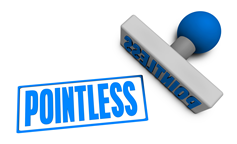13. Don’t Try to Sound ‘Official’
Trying to sound like a textbook is a common mistake, and one you should absolutely not make. Being boring is perhaps the most heinous of LinkedIn crimes, and if you’re found guilty of it you can be sure you’ll never get the results you want.
 Equally as sinful as appearing amateurish is being boring. Nobody wants to be bored.
Equally as sinful as appearing amateurish is being boring. Nobody wants to be bored.
They simply won’t put up with it.
Have you ever read through a report – probably at work – and realised at the end that you have no idea what it said? That author committed the offence of being boring, and paid the price.
We all have to read boring things from time to time, but LinkedIn profiles don’t fall into that category. Nobody is obligated to read your profile, so bore them at your peril.
People often feel that professional resources, such as LinkedIn Profiles, should be devoid of personal feeling… That it should simply be a statement of facts.
Unfortunately, that’s boring.
Worse even that that, though, it doesn’t even make you sound credible. It makes you sound officious, unimaginative, and generally… well… boring.
Would you hire someone like that?
By injecting your personality into your writing – subject to the planning process of course – you have a far better opportunity to present yourself as an expert. It’s also much more interesting for the reader, which makes it far more likely that they’ll read to the end.
Which leads me on to my second point.
Some people will inevitably be concerned that by injecting their personality into their writing, they’ll push some readers away.
To that I say: Of course you will. And that’s a good thing.
People don’t expect to agree with everything you say. It would be pretty weird if they did. And if they dislike your personality so much they choose to go elsewhere, you can bet that you would never have had a good working relationship anyway.
Ultimately, the benefits of demonstrating your humanity far outweigh the loss of a few readers along the way.
14. Avoid Pointless Adverbs & Adjectives
Pointless describing words make your writing feel cheap and amateurish. You may not need to be a good writer for your work, but I’m afraid you will need to put some work in if you want real results from LinkedIn.
 Call me a pedant, but this is a real pet peeve of mine, and it also weakens otherwise good writing. For clarification:
Call me a pedant, but this is a real pet peeve of mine, and it also weakens otherwise good writing. For clarification:
An adverb is a word that describes a verb. These are often words ending in -ly, e.g. ‘He ran quickly’ or ‘He yawned hugely’.
An adjective is a word that describes a noun, e.g. a huge rat or a cavernous hall.
Used properly, these describing words can provide valuable colour to your LinkedIn profile. Used poorly, they can make you look like an idiot.
Is it important to your point that you rose quickly through the ranks? Or that your venture was enormously successful? If so, by all means include it. If it isn’t, don’t bother – It’s unnecessary.
Worse even than unnecessary describing words are those that are entirely redundant.
The word ‘redundant’ has a specific meaning: Not or no longer needed or useful; superfluous
It’s not possible for something to be entirely redundant or somewhat redundant – it simply is redundant. The word alone is sufficient to convey your meaning.
Other examples would be very awesome, totally catastrophic or extremely beautiful. The words awesome, catastrophic and beautiful already have ‘extreme’ meanings. They don’t need further endorsement, and worse, any attempt to amplify their meaning will only weaken them.
So don’t do it.




